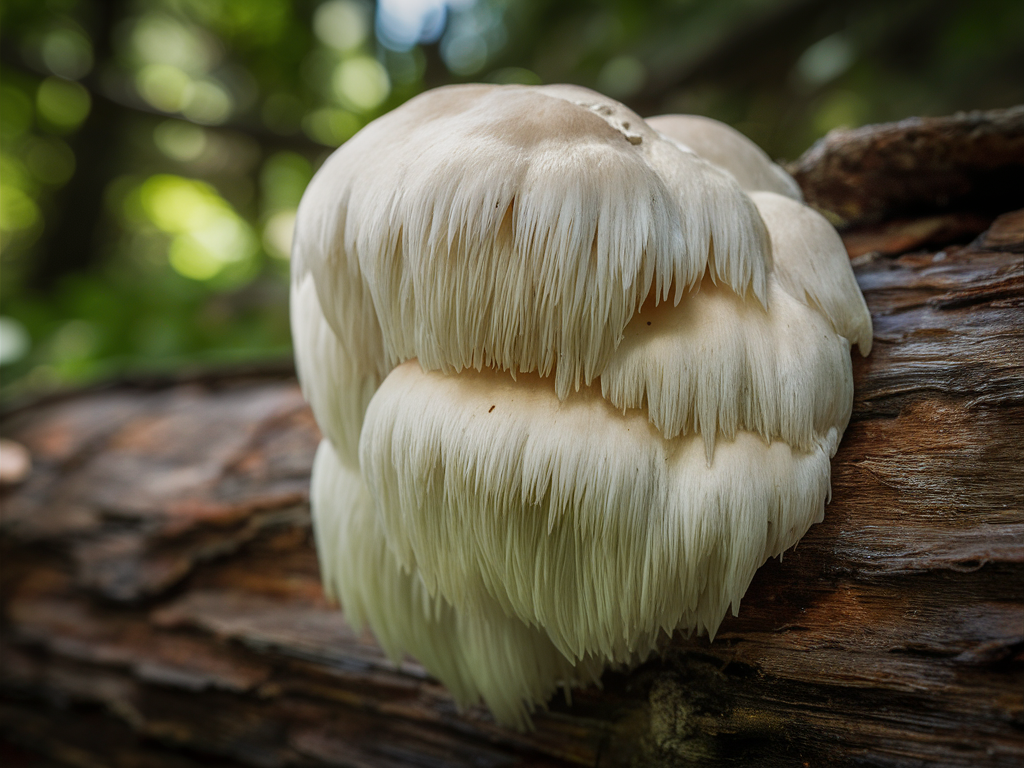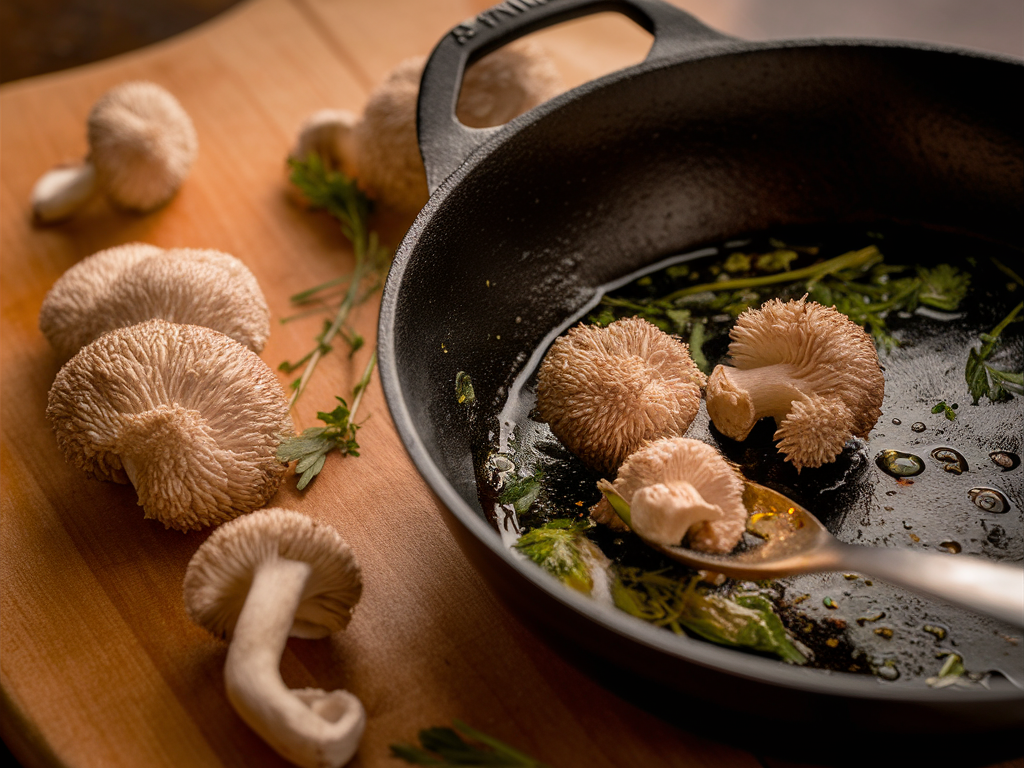Lion’s mane mushroom (Hericium erinaceus) has emerged from ancient Eastern medicine to become one of today’s most researched functional fungi. With its distinctive appearance resembling a lion’s flowing mane, this remarkable medicinal mushroom offers much more than meets the eye – containing powerful bioactive compounds that science is now confirming provide substantial health benefits.

Long before modern science began unveiling its secrets, Lion’s Mane mushroom (botanically known as Hericium erinaceus) held an esteemed place in traditional Chinese and Japanese medicine. For centuries, practitioners used this distinctive fungus to support overall wellness, longevity, and particularly digestive and neurological health.
Today, Lion’s Mane has captivated the attention of Western researchers, nutritionists, and health enthusiasts alike. Its popularity has surged as scientific studies continue to validate what ancient healers understood intuitively – this mushroom offers remarkable therapeutic potential.
What makes Lion’s Mane particularly valuable are its unique bioactive compounds, including:
- Hericenones: Found primarily in the fruiting body
- Erinacines: Concentrated in the mycelium
- Beta-glucans: Polysaccharides with immune-modulating properties
- Antioxidants: Compounds that fight oxidative stress
These compounds work synergistically to deliver an impressive array of health benefits that modern research continues to validate. Let’s explore what science reveals about this fascinating fungus.
The 10 Proven Health Benefits of Lion’s Mane Mushroom
1. Enhances Cognitive Function
Perhaps Lion’s Mane’s most celebrated attribute is its remarkable impact on brain health. Research has demonstrated that compounds in this mushroom can stimulate the production of Nerve Growth Factor (NGF), a protein crucial for the maintenance and growth of neurons.
A double-blind, placebo-controlled study published in the Journal of Medicinal Food found that older adults with mild cognitive impairment who consumed Lion’s Mane for 16 weeks showed significant improvements in cognitive function compared to those taking a placebo.
The mushroom’s cognitive-enhancing effects make it particularly valuable for:
- Improving memory and recall
- Enhancing focus and concentration
- Supporting overall mental clarity
- Potentially slowing age-related cognitive decline
2. May Help Prevent Alzheimer’s Disease
Building on its cognitive benefits, scientific evidence suggests Lion’s Mane may play a role in preventing neurodegenerative conditions like Alzheimer’s disease.
Research published in the International Journal of Molecular Sciences reveals that Lion’s Mane extracts may inhibit the formation of beta-amyloid plaques – abnormal protein buildups that characterize Alzheimer’s disease. Additionally, its anti-inflammatory properties may help reduce neuroinflammation, another key factor in neurodegenerative disease progression.
Several in vitro and animal studies demonstrate Lion’s Mane’s potential to:
- Reduce beta-amyloid plaque formation
- Protect neurons from damage
- Support brain cell regeneration
- Improve brain plasticity
3. Reduces Symptoms of Depression and Anxiety
Lion’s Mane’s neurological benefits extend to emotional well-being. Research suggests its ability to promote neurogenesis (the formation of new neurons) may positively influence mood regulation.
A 4-week study published in Biomedical Research found that women consuming Lion’s Mane cookies reported significantly reduced symptoms of irritation and anxiety compared to those taking a placebo. Researchers attribute these effects to the mushroom’s anti-inflammatory properties and its ability to optimize the gut-brain axis.
While conventional treatments remain important for clinical depression and anxiety, Lion’s Mane offers a promising complementary approach with fewer side effects than many pharmaceuticals.
4. Accelerates Recovery from Nervous System Injuries
Lion’s Mane’s ability to stimulate NGF production makes it particularly valuable for nervous system recovery. Research in the International Journal of Medicinal Mushrooms suggests it may support nerve regeneration and accelerate healing after injury.
Studies on animal models have demonstrated promising results for:
- Peripheral nerve injuries
- Stroke recovery
- Spinal cord injury rehabilitation
While human clinical trials are still emerging, preliminary research suggests Lion’s Mane could become an important therapeutic agent in neurological rehabilitation protocols.

5. Boosts Immune System Function
Lion’s Mane contains beta-glucans and other polysaccharides known to modulate immune function. Research published in Food & Function demonstrates that these compounds can enhance the activity of macrophages and natural killer cells – vital components of our innate immune defense.
Additionally, Lion’s Mane exhibits:
- Potent antioxidant properties that combat oxidative stress
- Anti-inflammatory effects that help regulate immune response
- Prebiotic activity that supports gut microbiome health, where approximately 70% of our immune system resides
These immune-modulating properties make Lion’s Mane particularly valuable during cold and flu season or when the body needs additional immune support.
6. Improves Digestive Health
Historically, Lion’s Mane was used in traditional Chinese medicine to treat digestive ailments, and modern science is validating this application. Research indicates Lion’s Mane may protect and repair the mucosal lining of the digestive tract.
Studies published in the International Journal of Medicinal Mushrooms suggest Lion’s Mane can:
- Reduce inflammation associated with inflammatory bowel disease (IBD)
- Help manage symptoms of Crohn’s disease and ulcerative colitis
- Protect against gastric ulcers
- Support beneficial gut bacteria as a prebiotic
These digestive benefits likely contribute to Lion’s Mane’s overall health effects, as gut health increasingly appears connected to immune function, mental health, and systemic inflammation.
7. Contains Potential Anti-Cancer Properties
While research is still in early stages, multiple laboratory studies indicate Lion’s Mane may possess promising anti-cancer properties. Research published in Oncology Reports and other journals demonstrates that extracts from this mushroom can inhibit the proliferation of certain cancer cells.
Studies have shown Lion’s Mane’s potential against:
- Gastric (stomach) cancer
- Colon cancer
- Liver cancer
- Breast cancer
- Leukemia cells
Scientists attribute these effects to several mechanisms, including inducing apoptosis (programmed cell death) in cancer cells, preventing cancer cell migration, and exerting antioxidant effects. While promising, it’s important to note that most studies have been conducted in laboratory settings, and human clinical trials are still needed.
8. Manages Diabetes and Blood Sugar Levels
Lion’s Mane shows potential as a natural aid for diabetes management. Research in the Journal of Complementary and Integrative Medicine indicates that compounds in Lion’s Mane may help regulate blood glucose levels and improve insulin sensitivity.
Animal studies have demonstrated that Lion’s Mane can:
- Lower elevated blood glucose levels
- Protect pancreatic tissue from damage
- Reduce diabetic neuropathy symptoms
- Prevent diabetic kidney damage
These effects may be attributed to the mushroom’s anti-inflammatory and antioxidant properties, which help protect insulin-producing cells and improve cellular glucose uptake.
9. Promotes Heart Health
Cardiovascular disease remains a leading cause of death worldwide, making Lion’s Mane’s heart-protective properties particularly significant. Research published in the International Journal of Medicinal Mushrooms suggests this fungus may support cardiovascular health through multiple mechanisms.
Studies indicate Lion’s Mane can:
- Help reduce LDL (“bad”) cholesterol levels
- Prevent oxidation of cholesterol, which contributes to arterial plaque formation
- Lower triglyceride levels
- Reduce risk of blood clotting
- Support healthy blood pressure through its anti-inflammatory effects
These cardiovascular benefits likely stem from the mushroom’s rich array of antioxidants and its ability to modulate the body’s inflammatory response.

10. Enhances Overall Longevity and Wellness
Beyond its specific health applications, research suggests Lion’s Mane may promote overall longevity and wellness by addressing fundamental cellular and biological processes associated with aging.
Studies point to several anti-aging mechanisms:
- Cellular protection against oxidative stress
- Reduced inflammation at the cellular level
- Support for mitochondrial function (our cells’ energy-producing components)
- Potential activation of autophagy (cellular “cleanup” processes)
- Stress reduction through neurological pathway modulation
Furthermore, Lion’s Mane appears to work synergistically with other healthy lifestyle factors, potentially amplifying the benefits of proper nutrition, regular exercise, and stress management practices.
How to Incorporate Lion’s Mane into Your Diet
As interest in Lion’s Mane has grown, so too have the available options for incorporating this functional fungus into your daily routine. Common forms include:
- Supplements: Capsules and tablets standardized to specific bioactive compounds
- Powders: Easily added to smoothies, coffee, or other beverages
- Tinctures: Liquid extracts for faster absorption
- Whole mushrooms: Fresh or dried for culinary use
- Teas: Prepared from dried mushroom pieces
Based on current research, most studies showing benefits have used dosages ranging from 500mg to 3000mg daily of concentrated extract. However, optimal dosages may vary based on the specific preparation and individual health needs.
Culinary preparations of Lion’s Mane offer a delicious way to enjoy its benefits. When cooked, it develops a flavor and texture often compared to seafood, particularly crab or lobster. Popular preparations include:
- Sautéed as a meat substitute in plant-based dishes
- Added to stir-fries
- Incorporated into soups and broths
- Used in pasta dishes
Potential Side Effects and Precautions
Lion’s Mane mushroom is generally considered safe for most people when consumed in appropriate amounts. However, as with any supplement or functional food, certain precautions should be observed:
- Allergic reactions: Though rare, some individuals may experience allergic responses to mushrooms. Start with small amounts if you’re trying Lion’s Mane for the first time.
- Blood clotting: Lion’s Mane may have mild anticoagulant effects. Those taking blood-thinning medications or with bleeding disorders should consult their healthcare provider.
- Pregnancy and breastfeeding: Insufficient safety data exists for these populations, so caution is advised.
- Diabetes medications: Since Lion’s Mane may lower blood sugar, those on diabetes medications should monitor their levels carefully to avoid hypoglycemia.
- Quality considerations: Source Lion’s Mane products from reputable manufacturers who test for contaminants and standardize for bioactive compounds.
As with any supplement, it’s advisable to consult with a healthcare provider before beginning a Lion’s Mane regimen, particularly for those with existing health conditions or taking medications.
Conclusion
The scientific research surrounding Lion’s Mane mushroom continues to validate what traditional medicine practitioners have known for centuries – this remarkable fungus offers a wide array of health benefits. From its well-documented neuroprotective properties to its emerging applications for metabolic, digestive, and cardiovascular health, Lion’s Mane represents one of nature’s most promising functional foods.
As research advances, we can expect to see more clinical applications for this powerful mushroom, potentially including standardized medical protocols for neurodegenerative conditions, mood disorders, and immune system support. The future of Lion’s Mane research is bright, with ongoing studies continually revealing new therapeutic potentials.
For those looking to support their cognitive function, immune health, or overall wellness through natural means, Lion’s Mane offers a scientifically-backed option with a long history of traditional use. As always, the most effective approach to health combines such functional foods with a balanced diet, regular exercise, proper stress management, and appropriate medical care.

